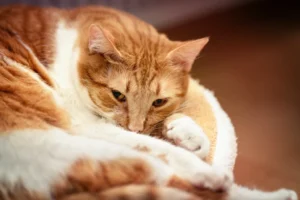Is your cat coughing but not producing a hairball? You’re not alone in wondering why this may be happening. Understanding the reasons behind your cat’s coughing can help you provide the best care possible for your furry friend.
If your cat is coughing but not bringing up a hairball, it could be due to a variety of reasons such as respiratory issues, asthma, allergies, or even heartworm disease. It’s important to consult with your veterinarian to properly diagnose the cause and determine the best course of action for your cat’s health.
Common causes of coughing in cats
Coughing in cats can be a concerning issue, especially when they don’t produce a hairball. While hairballs are a common cause of coughing, there are other reasons your feline friend may be experiencing these episodes without expelling a hairball.
One common cause of coughing in cats without a hairball is respiratory infections. These infections can irritate the respiratory tract, leading to coughing as the body tries to clear the air passages. Keep an eye out for other symptoms such as sneezing, nasal discharge, and lethargy, which could indicate a respiratory infection.
Another culprit could be allergies. Just like humans, cats can be allergic to various triggers such as pollen, dust, or certain foods. Allergies can manifest as coughing fits, so it’s essential to identify and eliminate the allergen to help your cat find relief.
Other potential causes of coughing in cats without hairballs include asthma, heartworm disease, or foreign objects lodged in the respiratory tract. If you notice persistent or severe coughing in your cat, it’s crucial to seek veterinary attention promptly.
Respiratory infections in cats
Respiratory infections are a common cause of coughing in cats and can be caused by viruses or bacteria. These infections can affect the upper respiratory tract, leading to symptoms such as coughing, sneezing, and nasal discharge.
Feline viral infections , such as feline herpesvirus or feline calicivirus, are common culprits of respiratory infections in cats. These viruses can cause inflammation in the respiratory tract, resulting in coughing episodes.
If your cat is experiencing coughing along with other symptoms like fever, loss of appetite, or difficulty breathing, it’s crucial to consult your veterinarian. Treatment for respiratory infections may include antibiotics, antiviral medications, or supportive care to help your cat recover.
Remember, early detection and intervention are key to managing respiratory infections in cats. Keeping your feline friend up to date on vaccinations and maintaining a clean living environment can help prevent these infections from occurring. If you suspect your cat may have a respiratory infection, don’t hesitate to seek professional veterinary care.
For more information on respiratory infections in cats, visit American Association of Feline Practitioners.
Allergies and coughing in cats
Allergies can often be the culprit behind your cat’s persistent coughing without producing a hairball. Just like humans, cats can develop allergies to various environmental factors such as pollen, dust mites, or certain foods. When your cat inhales or comes into contact with these allergens, it can trigger an immune response that leads to coughing.
To help manage your cat’s allergy-related coughing, consider reducing their exposure to potential allergens. This can include regularly cleaning and dusting your home, using an air purifier, and switching to a hypoallergenic cat food. Additionally, you may want to consult with your veterinarian to explore potential allergy testing and treatment options to provide relief for your feline friend.
Asthma in cats
Asthma is another common cause of coughing in cats, which can sometimes be mistaken for hairball-related issues. Cats with asthma may experience inflammation and constriction of their airways, leading to symptoms like coughing, wheezing, and difficulty breathing. If left untreated, asthma can significantly impact your cat’s quality of life.
If you suspect that your cat may have asthma, it’s essential to seek veterinary care for a proper diagnosis and treatment plan. Your vet may recommend medications such as bronchodilators or corticosteroids to help manage your cat’s symptoms and improve their respiratory health. Creating a comfortable and stress-free environment for your cat can also aid in managing asthma symptoms.
For an additional unique insight, consider integrating natural remedies like steam therapy or essential oils under the guidance of your vet to help alleviate respiratory symptoms in cats with asthma. This complementary approach, alongside conventional treatment, can provide holistic support for your furry companion’s respiratory health.
Remember, understanding the underlying causes of your cat’s coughing and working closely with your veterinarian are essential steps in ensuring your cat’s well-being and comfort.
Heartworm disease and coughing
Is your cat coughing but not producing a hairball? One possible reason could be heartworm disease. Yes, you heard that right – cats can get heartworm disease too! These pesky parasites are typically transmitted through mosquito bites and can wreak havoc on your feline friend’s health.
When heartworms infect your cat, they can travel to their lungs and cause irritation, leading to coughing fits. So if you notice your cat coughing persistently, it might be a good idea to get them checked for heartworm disease.
It’s essential to consult your veterinarian for proper diagnosis and treatment if heartworm disease is suspected. Early detection and intervention can help prevent serious complications and keep your kitty healthy and happy.
For more information on heartworm disease in cats, check out this reliable resource: American Heartworm Society
Treatment options for coughing in cats
If your cat is coughing but not bringing up a hairball, there could be various underlying issues causing this uncomfortable symptom. Some common causes include respiratory infections, asthma, allergies, or even heartworm disease, as mentioned earlier.
When it comes to treating coughing in cats, the approach will depend on the specific cause identified by your veterinarian. Treatment options may include medications to alleviate inflammation, antibiotics to treat infections, or even therapies for managing chronic conditions like asthma.
In some cases, lifestyle changes such as reducing exposure to irritants or allergens may also help alleviate coughing episodes in cats. It’s crucial to follow your vet’s recommendations closely and monitor your cat’s progress to ensure they’re responding well to the treatment.
Remember, if your cat is coughing persistently or if you notice any other concerning symptoms, don’t hesitate to seek professional veterinary care. Your furry companion’s health and well-being are worth every effort!
Preventing coughing in cats
If your cat is coughing but not producing a hairball, there are steps you can take to help prevent these coughing episodes and promote their respiratory health. Firstly, make sure your cat stays hydrated by providing fresh water daily. Dehydration can worsen respiratory issues, leading to more frequent coughing. Additionally, ensure your cat’s environment is clean and free of dust and allergens that could trigger coughing fits. Regularly clean your home, especially areas where your cat spends a lot of time.
Maintaining a healthy weight is also crucial for overall respiratory health in cats. Obesity can put extra strain on the respiratory system, leading to more coughing. Be mindful of your cat’s diet and encourage regular exercise to keep them at a healthy weight. Furthermore, regular visits to the vet are essential to catch any underlying health issues early on. Your vet can provide guidance on how to best care for your cat’s respiratory health and address any concerns about coughing.
Finally, consider using a quality air purifier in your home to remove airborne irritants that could be triggering your cat’s coughing. This can help create a cleaner and healthier environment for your feline friend to breathe easily. By taking these preventive measures, you can help reduce your cat’s coughing episodes and ensure they stay happy and healthy.
Additional Tip: You can also try adding a humidifier to your home, especially in dry climates or during the winter months. Increasing humidity can help soothe your cat’s respiratory system and reduce coughing episodes.
By being proactive in caring for your cat’s respiratory health, you can prevent coughing and ensure your furry companion is living their best life.
Alex, a passionate animal lover, has experience in training and understanding animal behavior. As a proud pet parent to two dogs and three cats, he founded AnimalReport.net to share insights from animal experts and expand his knowledge of the animal kingdom.









